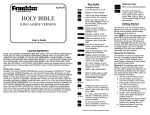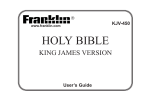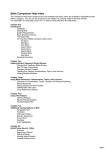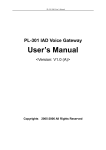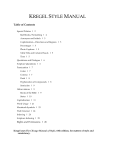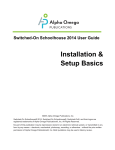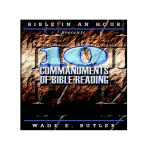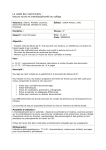Download Library of Congress Cataloging-in-Publication Data
Transcript
Visit Tyndale’s exciting Web site at www.tyndale.com New Believer’s Guide to the Bible Copyright © 2003 by Greg Laurie. All rights reserved. Designed by Kelly Bennema Unless otherwise indicated, all Scripture quotations are taken from the Holy Bible, New Living Translation, copyright © 1996. Used by permission of Tyndale House Publishers, Inc., Wheaton, Illinois 60189. All rights reserved. Scripture quotations marked NIV are taken from the Holy Bible, New International Version®. NIV®. Copyright © 1973, 1978, 1984 by International Bible Society. Used by permission of Zondervan Publishing House. All rights reserved. Scripture quotations marked “NKJV” are taken from the New King James Version. Copyright © 1979, 1980, 1982 by Thomas Nelson, Inc. Used by permission. All rights reserved. Scripture quotations marked NASB are taken from the New American Standard Bible, © 1960, 1962, 1963, 1968, 1971, 1972, 1973, 1975, 1977 by The Lockman Foundation. Used by permission. Scripture quotations marked NRSV are taken from the New Revised Standard Version of the Bible, copyrighted 1989 by the Division of Christian Education of the National Council of the Churches of Christ in the United States of America, and are used by permission. All rights reserved. Scripture quotations marked KJV are taken from the Holy Bible, King James Version. Library of Congress Cataloging-in-Publication Data Laurie, Greg. New believer’s guide to the Bible / Greg Laurie ; with Linda Taylor. p. cm. Includes bibliographical references. ISBN 0-8423-5573-1 (pbk.) 1. Bible—Introductions. I. Taylor, Linda Chaffee, 1958- II. Title. BS475.3 .L38 2003 220.6′1—dc21 2002015183 Printed in the United States of America 08 8 07 7 06 6 05 5 04 4 03 3 2 1 Contents 1. Why Read the Bible? . . . . . . . . . . . . . . . . . . . 1 2. What the Bible Says about Itself . . . . . . . . . . . . 15 3. How You Can Know the Bible Is True . . . . . . . . 25 4. How to Study the Bible . . . . . . . . . . . . . . . . . 37 5. Overview of the Bible. . . . . . . . . . . . . . . . . . 51 52 Great Bible Stories . . . . . . . . . . . . . . . . . . . 79 Through the New Testament in a Year . . . . . . . . . 87 1 Why Read the Bible? Let’s talk about the Bible. You’re a new believer. You’ve accepted Jesus as your Savior. Now you need some practical guidance that will help you live this new life. You need to read the Bible. Perhaps you’ve had one in your hands. You flipped it open, scanned some of the books, got really confused (perhaps you couldn’t even understand some of the words, let alone the context), and put it aside as hopeless. Maybe you’ve read a little bit. You began in Genesis and found it to be fairly interesting. Exodus was really good until about halfway through and then you began to get a little stuck. But you persevered—that is, until you hit Leviticus and all bets were off. So what’s in this book called the Bible? Other Christians you know claim it’s the most important book in their lives. If they’re called upon to open to a certain book of the Bible—they can do it! They seem to comprehend what’s going on. Well, fear not. You can do the same. And this little book will help you along the way. 1 New Believer’s Guide to the Bible God’s Gift to You I can still remember the first time I started to read this incredible book, the Bible. I was able to find a very understandable translation and that made a big difference. I soon discovered that this “user’s manual” was the guide to life I had long been searching for. And it’s available for you as well. Although the Bible continues to be the best-selling book of all time, it’s also true that very few people actually sit down and read it. Even among Christians there is sometimes a disconnect. Many crack open their Bibles only on Sunday mornings at church, whereas the rest of the week it gathers dust on the nightstand. Some people may avoid reading the Bible because they just don’t know what to do with it. It doesn’t make sense. It’s unlike any other book they’ve read. It’s divided up funny. It has weird language. It seems almost archaic at times. And yet it’s very current. There’s a single plot line and a central cast of characters. And what’s really amazing is that it actually foretells the future. But more about that later. First, to the issue at hand. A USA Today survey of Americans revealed that more than 80 percent—including 71 percent of college graduates—believe the Bible is the inspired Word of God. Thirty-four percent believe the Bible is the actual Word of God, to be taken literally, word for 2 Why Read the Bible? word. However, the survey also revealed that people’s beliefs about the Bible did not necessarily correspond to their familiarity with what the Bible actually says. For example, half of those who said they read the Bible regularly could not name any of the four Gospels of the New Testament. (The other 50 percent were able to name at least one.) Fewer than half knew who delivered the Sermon on the Mount. And even though 60 percent of Americans attend church on Easter Sunday, one-fourth did not know what the occasion signifies! That’s definitely a problem. So we have the Bible at our fingertips, but many of us don’t read it! Meanwhile, there are people all over the world who would give anything to have a copy of the Bible to read for themselves. In some countries, a church might have a single Bible—which they cut apart in order to pass the pages around to the people in the congregation. A person might receive a page to read for a while and then pass it along to someone else in time to get the next page. A typical Christian bookstore in the United States has an overwhelming array of Bibles for sale. There are countless versions, with various types of study aids and other tools, and several different translations—not to mention the variety of bindings, from hardback to paperback to genuine or bonded leather. Throw in all the different sizes and it can be mindboggling! Don’t get me wrong. I think it’s wonderful that we 3 New Believer’s Guide to the Bible have so many choices. What’s sad is to have such an abundance and yet squander it. We have so much available, yet so few people read and treasure God’s Word. I’m reminded of a true story I heard about a young man graduating from college. He hoped that his dad would give him a new car for a graduation present. Many of the other kids’ fathers had given them new cars, and this boy wanted one too. He had even picked out the one he wanted and told his father about it. When graduation day finally arrived, the young man was shocked when his father handed him a brand new Bible instead of car keys. He was so outraged that he turned and walked away—leaving his father holding the Bible. The boy was so bitter that he cut off all contact with his father until the day his dad died. Preparing for the funeral, the boy (now a man) went to his father’s house to help get his affairs in order. There, sitting on a shelf, was the Bible his father had given him for graduation. With tears in his eyes, he blew off the dust and opened it for the first time. Much to his amazement, he found an envelope with his name on it tucked inside the Bible. He opened it and found a cashier’s check in the exact amount of the car he had picked out years ago. In other words, his father had given him what he wanted, but he had to open the Bible to find out. Instead, he lost out on the 4 Why Read the Bible? car and a lifelong relationship with his father because he refused to open his Bible and discover the gift. Sadly, that is essentially what we do when we never open the book that our heavenly Father has given us. Because inside this book is something far more valuable than a cashier’s check. The User’s Manual for Life In the Bible we find words of life. In it is the truth about how to get to heaven. In it are the very words of God to us. What could be more valuable than that? Like any good instruction book, this “user’s manual for life” tells us how to put it all together so that it works right. But if you’re like me with most user’s manuals, you’re more likely to try out the gadget first and read the directions later (and usually end up doing something the manual says you shouldn’t do). Some products come with a warning label. Some of these labels are helpful, and some are just plain silly. But most labels are probably there because somebody, somewhere, did something they shouldn’t have done. Here are a few examples of warning labels I have read: ● ● ● On a cardboard windshield shade: “Warning. Do not drive with sun shield in place.” On a hair dryer: “Do not use while sleeping.” On an electric rotary tool: “This product is not intended for use as a dental drill.” 5 New Believer’s Guide to the Bible ● ● In the manual for a microwave oven: “Do not use for drying pets.” On a child-size Superman costume: “Wearing of this garment does not enable you to fly.” Think of those poor people who tried to dry their hair while sleeping or tried to fly because they had on a cape. If only they had read the directions and warnings first! The same is true of life. The Bible gives us directions and warnings because God knows how sinful we are. The Bible has been used as a decoration on coffee tables, a booster seat for toddlers, a prop for preachers to wave in the air during a sermon, a place for witnesses to rest their left hand while taking an oath, or a convenient location to record the family tree. But how often is the Bible read—and, most importantly, obeyed? Unfortunately, not often enough, even by Christians. Don’t make the same mistake. The Bible is not a Christian prop; it’s God’s direct message to you. Why read the Bible? Here are four good reasons: 1. Studying the Bible is necessary for your spiritual growth. The Bible tells you everything you need to know to grow in your new spiritual life. 2. Studying the Bible keeps you spiritually strong. The more you get into this book and apply its 6 Why Read the Bible? teachings, the more you will be able to stand your ground in the storms and trials of life. 3. Studying the Bible gives you a “biblical worldview.” During these confused times of moral relativism, God desires that you make the Bible an integral part of your life. 4. Studying the Bible helps you apply its truth to your life. You will notice positive changes in your life as you apply what you read in Scripture. Listen! Success or failure in your Christian life depends on how much of the Bible you get into your heart and mind on a daily basis and how obedient you are to it. If you neglect to study the Scriptures, your spiritual life will ultimately unravel. Everything you need to know about God is taught in the Bible. A Book unlike All Others The Bible is altogether different from any other book you’ll ever read. Take your favorite novel, for example. After you’ve read it once or twice, you’re done. You might pick it up again a few years later just to refresh your memory about a familiar story or a style of writing that captured your imagination. But chances are you read it once and moved on to something else. The Bible, on the other hand, is not a book you’ll read through one time and return to the shelf to collect dust. The Bible is not a book that can be grasped 7 New Believer’s Guide to the Bible completely in one reading. Why? Because the Bible is a living book. The word of God is living and active. Sharper than any double-edged sword, it penetrates even to dividing soul and spirit, joints and marrow; it judges the thoughts and attitudes of the heart. (Hebrews 4:12, NIV) You can read the same Bible passage a hundred times in your lifetime, and the one-hundred-first time you may discover something you never noticed before, or you may learn a lesson that applies to your life right at that moment. The Word of God is not simply a collection of words from God, a vehicle for communicating ideas; it is living, life-changing, and dynamic as it works in us. With the incisiveness of a surgeon’s knife, God’s Word reveals who we are and what we are not. It penetrates the core of our moral and spiritual life. It discerns what is within us, both good and evil. The demands of God’s Word require decisions. We must not only listen to the Word; we must also let it shape our lives.1 That’s why you want to keep reading it. Yet there’s more to it than just reading along to 1Life Application Bible, New International Version (Tyndale House and Zondervan, 1992), note on Hebrews 4:12. 8 Why Read the Bible? feel good. You need to study the Bible in order to deepen your understanding and apply God’s Word correctly. To make the most of your Bible study, you can read on your own and you can learn from others—pastors and teachers whose job it is to explain the Scriptures to you. You need to read the entire book so you can understand specific passages in their full context and so you can understand the entire scope of God’s revealed will in a particular area. You need to understand the relationship of the Old Testament to the New Testament. In short, you need to become a disciple. What It Means to Be a Disciple The word disciple means “learner, a pupil, one who comes to be taught.” However, the relationship is not merely that of a student listening passively to a lecturer. A disciple listens attentively, with an intense desire to apply what is being taught, drinking in every word, marking every vocal inflection. We need inspired preaching and teaching, but we also need inspired listening! Think of a pitcher and catcher in a baseball game. The catcher doesn’t sit idly behind the plate, waiting for the pitch to hit his glove at speeds approaching one hundred miles per hour. If he did, he might get his head knocked off! Instead, he carefully watches each pitch and positions his glove and his body accordingly. The catcher is just as much a part of the 9 New Believer’s Guide to the Bible game as the pitcher. The two are working together toward a common goal: striking out the batter. As you sit in the pew on Sunday morning, the Holy Spirit is like the pitcher and you are like the catcher. The more attentive you are in listening to the Word of God, the greater the chances that each “pitch” will be a strike. You and the Holy Spirit share a common goal: that you will grow and flourish spiritually. It’s all about learning how to listen! This is why Jesus so often said, “Anyone who is willing to hear should listen and understand!” (Matthew 11:15; 13:9; 13:43). Sometimes we listen more carefully than at other times. For example, how many times have you tuned out aboard an airplane while the flight attendant explained what to do in case of an emergency landing? How different would it be if you were flying across the Atlantic Ocean and the flight attendant announced that the plane was having engine trouble? All of a sudden, you’d be very interested in knowing that your seat cushion could be used as a flotation device. Why? Because your life would depend on it! In the same way, your spiritual life depends on studying God’s Word. Simply listening to what Jesus teaches does not make anyone a true disciple. Only those who listen and obey what He says will be saved from destruction. If you and I want to be true disciples of Jesus Christ, we must study the Word and apply what we read. As the apostle Paul said, “Do not be 10 Why Read the Bible? conformed to this world, but be transformed by the renewing of your mind, that you may prove what the will of God is, that which is good and acceptable and perfect” (Romans 12:2, NASB). Here is a wonderful series of promises that will help us get the most from our study of Scripture: My child, listen to me and treasure my instructions. Tune your ears to wisdom, and concentrate on understanding. Cry out for insight and understanding. Search for them as you would for lost money or hidden treasure. Then you will understand what it means to fear the Lord, and you will gain knowledge of God. For the Lord grants wisdom! From his mouth come knowledge and understanding. He grants a treasure of good sense to the godly. He is their shield, protecting those who walk with integrity. He guards the paths of justice and protects those who are faithful to him. Then you will understand what is right, just, and fair, and you will know how to find the right course of action every time. (Proverbs 2:1-9) Let’s take a closer look at three key principles from this passage in Proverbs: Listen to God and Treasure His Instructions First, you must see the intrinsic value of God’s Word. This means you should be eager with anticipation 11 New Believer’s Guide to the Bible when you open the Bible, asking, “What will God say to me today?” As you read, it’s important to stop and think about what God might be showing you. Some people like to keep a journal where they can record thoughts, questions, prayers, and insights. This can be a helpful tool in your study. Take your time and meditate on what you read. You don’t need to read entire chapters or books at a time. Sometimes a few verses or paragraphs are all one can absorb. As you read, ask God to teach you how to treasure His Word. Cry Out for Insight and Understanding God doesn’t expect you to understand everything you read right away. He knows this is all new to you. He lovingly offers to guide and teach you. His Holy Spirit will give you insight and understanding. Tell God you need His help. Cry out to Him for the insight and understanding you need to be able to learn and apply His words to your life. Seek Wisdom As If You Were Searching for Lost Money or Hidden Treasure Want to attract a crowd? Drop a handful of change! Likewise, if you want to know God, He tells you to seek Him and His wisdom as though you were looking for lost money or digging for hidden treasure. Listen! There is buried treasure in the Bible! But you can only find it when you search. 12 Why Read the Bible? Help for Daily Living Proverbs 2:9 records an outstanding promise. Read it again: You will understand what is right, just, and fair, and you will know how to find the right course of action every time. When you’ve listened to God and treasured His instructions, cried out for understanding, and sought His will in His word as if looking for treasure—guess what? You’ll find the answers you need. You’ll understand the right, just, and fair thing to do, and you’ll know the right course of action every time! Jesus says, “If you continue in my word, you are truly my disciples” (John 8:31, NRSV). The word continue here is the same word he uses in John 15:7 where He speaks of “remaining” or “abiding” in His word: “If you abide in me, and my words abide in you, ask for whatever you wish, and it will be done for you” (John 15:7, NRSV). The word abide means to stay in a given place, to draw strength and resources from God. Picture a tree firmly planted in the ground. So we are to be planted in the Word. Psalm 1 says that we should meditate on God’s Word “day and night” (Psalm 1:2, NIV). If we are abiding in the Word, it means we’re drawing our ideas and lifestyle from the Word, and what we say and do will be affected. Abiding in God’s Word can transform your life. It 13 New Believer’s Guide to the Bible will sustain you through the difficulties you face each day. It will help you with your thought life. It will guide you as you conduct yourself at school, at home, and even in your free time. It will help you make decisions. It will comfort you. It will challenge you. It will change you from the inside out. It is only when you put yourself under the authority of God’s Word and submit to its teaching that you become a growing disciple. Colossians 3:16 says, “Let the word of Christ dwell in you richly” (NRSV). This literally means to “let the Word of Christ be perfectly at home in you.” God wants his Word to permeate every area of your life. 14

















